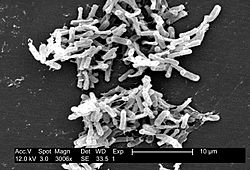Clostridium difficile facts for kids
Quick facts for kids Clostridium difficile |
|
|---|---|
 |
|
| Clostridium difficile is a rod-like bacterium | |
| Scientific classification | |
| Kingdom: | |
| Phylum: | |
| Class: | |
| Order: | |
| Family: |
Peptostreptococcaceae
|
| Genus: | |
| Species: |
C. difficile
|
| Binomial name | |
| Clostridium difficile Hall & O'Toole, 1935
|
|
Clostridium difficile is a type of bacteria. It is often called C. diff (pronounced "see diff"). This bacterium is found in the Clostridium group.
C. diff can live in the human colon (which is your large intestine) without causing any problems. About 2-5% of adults have C. diff in their colons. However, for some people, C. diff can cause serious illness. In these cases, the C. diff bacteria grow too much in the colon. They can attack the lining of the intestines, causing a problem called C. diff colitis. Colitis means the colon becomes swollen and irritated.
C. diff infection is becoming more common in hospitals, nursing homes, and other health care places. In the United States alone, it causes about 14,000 deaths each year.
Contents
What are the Signs of C. diff Infection?
The most common sign of a C. diff infection is severe diarrhea. People with C. diff infection might also have a fever, belly pain, not want to eat (loss of appetite), and feel sick to their stomach.
Some C. diff infections are not very serious. But in other cases, people can get very sick and even die. When someone has severe diarrhea from C. diff, they can become badly dehydrated (meaning they don't have enough fluid in their body). This can harm their kidneys. C. diff bacteria can also create a hole in the intestines, which is very dangerous.
Once a person has a C. diff infection, they can spread the infection to others. C. diff can live for a long time on surfaces like doorknobs, bed sheets, and medical equipment. If a person with C. diff infection doesn't clean their hands well, they can spread the bacteria to other people.
Who Usually Gets C. diff Infection?
C. diff infection often happens to people who are taking antibiotic medicine. Normally, your intestines are full of good, healthy bacteria. These healthy bacteria help keep C. diff bacteria under control. If antibiotic medicines kill these healthy bacteria, C. diff bacteria can grow too much.
C. diff infection is also more common in:
- People who are in hospitals, nursing homes, or other health care places.
- People who are 65 years old or older.
- People with weak immune systems (the body's defense against sickness).
- People who have recently had surgery on their intestines.
- People with colon problems, like inflammatory bowel disease or colon cancer.
- People who take certain antacid medicines called proton pump inhibitors. These medicines make the stomach produce less acid. Normally, stomach acid helps control bacteria like C. diff.
How is C. diff Infection Treated?
C. diff infection can be treated with certain antibiotic medicines. However, C. diff is an antibiotic-resistant bacteria. This means that many antibiotics cannot kill C. diff. This can make C. diff infection very hard to treat. Many people with C. diff infection have relapses, meaning they get better for a while but then get sick again. This happens to about one out of every five people with C. diff infection.
Doctors usually try an antibiotic called metronidazole first for C. diff infection. About three out of four people with C. diff infection get better after taking metronidazole for ten days. If metronidazole doesn't work, doctors give other antibiotics, usually vancomycin or fidaxomicin.
In very serious cases of C. diff infection that don't get better with antibiotics, doctors might do surgery to remove parts of the colon. Sometimes, doctors also use a treatment called fecal transplantation. This involves putting healthy gut bacteria from a donor into the sick person's gut. It has been shown to be very helpful, especially for people who keep getting C. diff infections.
How Can We Stop C. diff From Spreading?
Usually, C. diff infection can be prevented. Washing your hands is one of the best ways to stop C. diff infection. If a person has C. diff bacteria on their hands, they can kill the bacteria by washing their hands with soap and water. C. diff bacteria on surfaces (like doorknobs and medical equipment) can be killed with bleach. Many hospitals and health care places have special bleach wipes that kill C. diff. Washing sheets and clothes with bleach and detergent also kills C. diff.
It's important to know that alcohol does not kill C. diff. So, instant hand sanitizer and alcohol wipes will not stop C. diff bacteria from spreading.
Hospitals and other health care places can also use "C. diff precautions" to prevent the bacteria from spreading. (Precautions are ways of being careful.) When a patient has C. diff, health care workers can stop the bacteria from spreading by:
- Using gloves and then washing their hands every time they touch the patient, the patient's belongings, or anything in the patient's room.
- Cleaning medical equipment with special bleach wipes every time they use it.
- Cleaning the patient's belongings and the patient's room with bleach.
- Giving patients with C. diff infection private rooms, or putting them only with other patients who have C. diff infection.
See also
In Spanish: Clostridioides difficile para niños
 | Kyle Baker |
 | Joseph Yoakum |
 | Laura Wheeler Waring |
 | Henry Ossawa Tanner |

